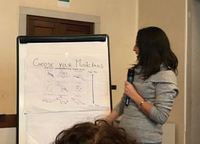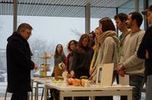Past Courses
SoSe 2023: Seminar Public Engagement in Science, Technology, and the Environment
This course will introduce students to a range of participation methods and concepts, such as citizen science and 'hybrid forums', developed to democratise science and technology, and to engage a wider public concern for the environment. It will both look at the practical design of participation formats, and offer a critical perspective by scrutinizing theories and approaches that inform them. We will focus on debates in the field of science and technology studies (STS), science communication studies and related fields, and apply theories and concepts to controversial issues, such as Covid-19 vaccination, GMOs, xenotransplantation, geoengineering, as well as scientific fraud and misconduct. Students will also work in groups to design a participatory, public engagement scheme by selecting a contemporary topic related to their research interests.
WiSe 2020-2021, SoSe 2021: Research Course / Forschungspraktikum
8 weeks with 40 hours; in English or German
Work with LMU’s Life Sciences in Society faculty to research content for the main exhibition of BIOTOPIA – Naturkundemuseum Bayern, currently in development, focused on behaviours, activities and processes employed across the living world (i.e. Sensing and Communicating). This will involve researching key subthemes and identifying scientific references and resources, including relevant cutting-edge research, current discourses and paradigms, potential objects from museum collections, Bio-Art works, benchmark exhibitions and public programs, and much more. Students will then propose and develop original ideas for public engagement opportunities (i.e. citizen science projects, educational workshops, etc.), focused on one of BIOTOPIA’s themes which also aligns to and supports the student’s individual study program. There is the potential to test and evaluate the proposed projects in real life with visitors to the BIOTOPIA Lab or at BIOTOPIA’s annual summer festival. There will be a written report and presentation required at the end of the course.
This is an ongoing course, please go to LSF for further details.
SoSe 2021: Life Science Communication Seminar
This three-day seminar is divided into a section on Science Communication theory, in which participants explain and discuss aspects of effective sciences communication strategies in seminar presentations, and a practical section, in which participant groups apply this knowledge to develop workshop programs around one of the content areas planned for BIOTOPIA – Naturkundemuseum Bayern, i.e. one of the "Behaviour Exhibits" of their choice for a target group of their choice for real-life implementation in the BIOTOPIA Lab.
WiSe 2021-2022: Seminar on Science Communication in times of Planetary Crisis
This seminar takes place in cooperation with the Institute for Communication Science and Media Research.
How can we communicate science effectively in a time of planetary crisis? How does misinformation shape the public discourse on topics ranging from climate change and pandemics to the biodiversity crash? What modes of communication are appropriate for different public and stakeholders of science? What role does emotion place in science communication? How should we communicate about wicked problems and complex systems? This new seminar will provide an introduction into key current concepts and literature in science communication studies, and invite students from biology and communication to work together on a developing and realizing a collaborative final project.
09.05.2022: Lehrerfortbildung zur Biodiversitätskrise bei Amphibien (in German)
Ob knallbunt oder gut getarnt, hochgiftig oder wohlschmeckend, eierlegenkhalt durch Schutzprojekte schwinden viele Frosch- und Salamanderpopulationen – auch hier in Bayern.
Nach einer allgemeinen Einführung zur Biologie und Gefährdung von Amphibien wird Heiko Werning, Mitbegründer des Vereins Frogs&Friends und des Projektes Citizen Conservation berichten und Möglichkeiten für ein Engagement von Schulen darlegen. Anschließend stellt Dr. Michael Germ, Gymnasiallehrer für das Fach Biologie, den Lehrplanbezug zu den behandelten Themen her und macht Vorschläge, wie Amphibien und andere Wirbeltiergruppen im Unterricht unter konzeptueller Perspektive thematisiert werden können.
Im Praxis-Teil der Fortbildung unternehmen wir eine kurze Amphibienexkursion in den botanischen Garten (keine besondere Kleidung erforderlich) und betrachten lebende Amphibien und deren Haltung im Terrarium im BIOTOPIA Lab.
WiSe 2017-2018: Seminar "THE SENSES: CROSS-SPECIES PERSPECTIVES FROM NEUROSCIENCE AND ART"
How can we bring neuroscience and the arts together to help us understand vision, hearing and olfaction? How do different species sense the world? How can we emulate and extend the senses? This seminar, led by Prof Michael John Gorman, founding director of BlOTOPIA, a major new museum for life sciences planned at Schloss Nymphenburg in Munich, and Prof Benedikt Grothe of the Munich Centre for Neuroscience will invite students to work in groups to develop exhibit ideas for BlOTOPIA around the theme of Sense. Internationally eminent guest faculty including Professor Barry Smith, Director of the Institute of Philosophy at the University of London, and artist and "smell provocateur" Sissel Tolaas will provide inspiration and guidance for student projects.
This seminar and the projects generated from it will explore the boundaries of art and design, science and audience engagement in order to develop new innovative ideas where these disciplines meet. It is a cross disciplinary seminar designed to stimulate the development of unique, compelling ideas through collaborative student group projects, guided by experts from the fields of science and art.
Student projects will be presented at the end of the seminar and have the potential to be used by BIOTOPIA's content development team in a number of ways, including inspiration for the permanent exhibition, temporary exhibitions or rotating "pocket exhibitions", among many other possibilities. This is a unique opportunity for students to not only hear from renowned scientists and artists working on the Senses, but to translate their own scientific skills and knowledge into a museum exhibit with which a wide range of audience can engage.
- WHERE: Venice International University San Servolo, Venice
- WHEN: November 29 – December 1, 2017
- ORGANIZING FACULTY:
- Prof. Michael John Gorman, Founding Director of BlOTOPIA - Naturkundemuseum Bayern
- Prof. Benedikt Grothe, LMU Neurobiology, Max Plank Institute of Neurobiology
- GUEST FACULTY:
- Prof. Dr. Barry C. Smith, Institute of Philosophy at the University of London
- Prof. Dr. Mark Hubener, Munich Center for Neuroscience, Max Plank Institute for Neurobiology
- Denis Connolly and Anne Cleary, the school of looking
- David Rothenberg, Distinguished Professor of Philosophy and Music, New Jersey Institute of Technology
- Sissel Tola as, professional artist and researcher known for her work with smell
- COORDINATOR: Dr. Samara Rubinstein, Content Curator of BlOTOPIA - Naturkundemuseum Bayern
WiSe 2018-2019: Seminar "THE FUTURE SUPPER" - SUSTAINABLE FOOD DESIGN
This seminar is an interdisciplinary collaboration between the following:
- LMU Life Sciences in Society and BIOTOPIA – Naturkundemuseum Bayern
- LMU Institute of Genetics
- Munich University of Applied Sciences
A 3-day seminar bringing together scientists, designers and museum professionals to tackle current issues around sustainable food. Biology students from LMU Institute of Genetics and design students from the Munich University of Applied Sciences work together to develop and prototype micro-exhibits on the topic of sustainable food which will be shared at the end of the seminar as a “meal” and potentially presented by the students at the first BIOTOPIA Festival, “EAT”, May 24-26, 2019.
- WHERE: LMU Biozentrum and Munich University of Applied Sciences
- WHEN: January 12 - January 14, 2019
- STUDENTS: 12 students from LMU Institute of Genetics, 16 students from Munich Univ. of Applied Science
- ORGANIZING FACULTY:
- Prof. Ralph Ammer
Munich Univ. of Applied Science -
Prof. Martin Parniske
LMU Institute of Genetics -
Dr. Dagmar Hann
LMU Institute of Genetics -
Prof. Michael John Gorman
LMU Life Sciences in Society
BIOTOPIA – Naturkundemuseum Bayern -
Dr. Samara Rubinstein
LMU Life Sciences in Society
BIOTOPIA – Naturkundemuseum Bayern



